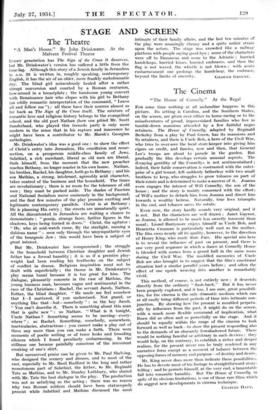STAGE AND SCREEN The Theatre
Evanv generation has The Sign of the Cross it deserves,
but Mr. Drinkwater's version has suffered a little from the time-lag. Although this story of a Jewish family in Jerusalem
in A.D. 33 is written in, roughly speaking, contemporary English, it has the air of an older, more frankly melodramatic day. The blind girl miraculously healed after a rather abrupt conversion and courted by a Roman centurion, bow-armed in a breastplate ; the handsome young convert with Renaissance hair who elopes with his girl to Bethank (an oddly romantic interpretation of the command, " Leave all and follow me ") ; all these have their sources almost as far back as The Sign of the Cross itself. The mixture of romantic love and religious history belongs to the evangelical school, and the old poet Nathan (how one pitied Mr. Scott Sunderland, who played this tremolo part) is only more modern in the sense that in his rapture and innocence he might have been a contributor to Mr. Marsh's Georgian anthologies.
Mr. Drinkwater's idea was a good one : to show the effect of Christ's entry into Jerusalem, His crucifixion and resur- rection, on a prosperous middle-class family of Jews. Salathiel, a rich merchant, liberal as old men are liberal, finds himself, from the moment that the , new preacher reaches Bethany, no longer master in his own house.. Nathan, his brother, Rachel, his daughter, both go to Bethany ; and his son Mathias, a strong, intolerant, agreeably acid character, takes control of the business and the household. The times are revolutionary ; there is no room for the tolerance of old men ; they must be pushed aside. The shades of Fascism and National Socialism move ominously in the background, and the first few minutes of the play promise exciting and legitimate contemporary parallels. Christ is at Bethany ; He is planning His entry ; the streets are unnaturally quiet. All the discontented in Jerusalem are waiting a chance to demonstrate : " gossip, strange faces, furtive figures in the shadows, keys being turned in doors." Christ, the agitator : " He, who at mid-watch came, By the starlight, naming a dubious name " : seen only through the unsympathetic eyes of the bourgeois Jew : this would have been a subject of great interest.
But Mr. Drinkwater has compromised ; the struggle in the household between Christian daughter and Jewish father has a formal banality ; it is as if a prentice play- wright had been reading his textbooks on the subject of conflict in drama. Religious inspiration must not be dealt with superficially ; the theme in Mr. Drinkwater's Play seems banal because it is too great for him. The dialogue; pleasantly concrete in the ease of Mathias, the young business man, becomes vague and sentimental in the case of the Christians : Rachel, the servant Jacob, Nathan, Esther, the blind daughter. " He made ,me feel somehow that I—I mattered, if you understand. Not grand, or anything like that—but—somebody " : so the boy Jacob. " You can't describe it. There is something about this man that' is quite new " : 'so Nathan. " What is it tonight, Uncle Nathan ? Something seems to be moving—every- where " : so Rachel. Something, somebody, somewhere, inarticulacies, abstractions : you cannot make a play out of these any more than you can make a faith. There were moments of poetic writing or of tense looks and brooding silences which I found peculiarly embarrassing. In the stillness one became painfully conscious of the irreverent creaking of one's shirt.
But unreserved praise can be given to Mr. Paul Shelving, who designed the scenery and dresses, and to most of the cast, especially to Mr. Basil Radford in the long and rather monotonous part of Salathiel, the father, to Mr. Reginald Tate as Mathias, and to Mr. Stanley Lathbury, who shared with Mr. Tate the best dialogue in the play. The production was not as satisfying as the acting ; there was no reason why twp Roman soldiers should have been statuesquely present while Salathiel and Mathias discussed the most
intimate of their family affairs, and the last ten minutes of the play were amazingly clumsy and a quite unfair strain upon the actors. The stage was crowded like a railway platform with people saying good-bye ; some of the characters were off to Damascus and some to the Adriatic ; hurried handclasps, hurried kisses, hurried embraces, and then the flag is not waved, the whistle is not blown ; with acute embarrassment one prolongs the handclasp, the embrace,


































 Previous page
Previous page